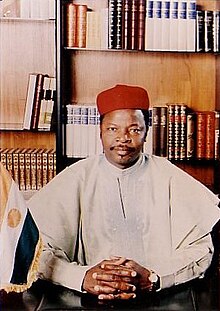Mahamane Ousmane: Difference between revisions
No edit summary |
No edit summary |
||
| Line 1: | Line 1: | ||
[[Image:Mahamane_Ousmane.jpg|thumb|right|Mahamane Ousmane]] |
[[Image:Mahamane_Ousmane.jpg|thumb|right|Mahamane Ousmane]] |
||
'''Mahamane Ousmane''' (born [[20 January]] [[1950]]) is a [[Niger|Nigerien]] [[political figure]]. He served as the [[president of Niger]] from [[16 April]] [[1993]]<ref name="State">[http://dosfan.lib.uic.edu/erc/bgnotes/af/niger9407.html Background Notes: Niger, July 1994], U.S. Department of State.</ref> to [[27 January]] [[1996]]. He was the first democratically elected president of Niger. In elections held on [[February 27]], 1993, Ousmane came in second, with 26.59% of the vote, behind [[Tandja Mamadou]], but he won the presidency in the second round, held on [[March 27]], taking 54.42%.<ref>[http://africanelections.tripod.com/ne.html Elections in Niger], African Elections Database.</ref> |
'''Mahamane Ousmane''' (born [[20 January]] [[1950]]) is a [[Niger|Nigerien]] [[political figure]]. He served as the [[president of Niger]] from [[16 April]] [[1993]]<ref name="State">[http://dosfan.lib.uic.edu/erc/bgnotes/af/niger9407.html Background Notes: Niger, July 1994], U.S. Department of State.</ref> to [[27 January]] [[1996]]. He was the first democratically elected president of Niger. In elections held on [[February 27]], 1993, Ousmane came in second, with 26.59% of the vote, behind [[Tandja Mamadou]], but he won the presidency in the second round, held on [[March 27]], taking 54.42%.<ref name="Elections">[http://africanelections.tripod.com/ne.html Elections in Niger], African Elections Database.</ref> |
||
Following the resignation of prime minister [[Mahamadou Issoufou]] and the withdrawal of his party from the governing coalition in September 1994, the coalition lost its majority and new parliamentary elections were called for January 1995. These elections resulted in an opposition victory and forced [[Cohabitation (government)|cohabitation]] between Ousmane and an opposition-controlled parliament headed by prime minister [[Hama Amadou]]. After nearly a year of this situation of political "deadlock", [[Ibrahim Baré Maïnassara]] seized power in a military coup in January 1996; Ousmane was arrested, along with Amadou and Issoufou, and subsequently placed under house arrest until April.<ref name="AI">[http://web.amnesty.org/library/Index/ENGAFR430021996?open&of=ENG-NER "Niger: A major step backwards"], Amnesty International, 16 October 1996.</ref> |
Following the resignation of prime minister [[Mahamadou Issoufou]] and the withdrawal of his party from the governing coalition in September 1994, the coalition lost its majority and new parliamentary elections were called for January 1995. These elections resulted in an opposition victory and forced [[Cohabitation (government)|cohabitation]] between Ousmane and an opposition-controlled parliament headed by prime minister [[Hama Amadou]]. After nearly a year of this situation of political "deadlock", [[Ibrahim Baré Maïnassara]] seized power in a military coup in January 1996; Ousmane was arrested, along with Amadou and Issoufou, and subsequently placed under house arrest until April.<ref name="AI">[http://web.amnesty.org/library/Index/ENGAFR430021996?open&of=ENG-NER "Niger: A major step backwards"], Amnesty International, 16 October 1996.</ref> |
||
Ousmane received second place in the [[July 7]]–[[July 8|8]], 1996 presidential election, which was won by Maïnassara; on the second day of polling he was again placed under house arrest and was freed after two weeks.<ref name="AI"/> He took third place, with 22.51% of the vote, in the October 1999 presidential election, which occurred after the assassination of Maïnassara; he placed slightly behind second-place finisher Issoufou and therefore did not participate in the run-off. Ousmane again took third place in the November 2004 election, on which occasion he took 17.4% of the vote. Ousmane has been president of the country's [[National Assembly of Niger|National Assembly]] since 1999 and is leader of the [[Democratic and Social Convention-Rahama]] party. |
Ousmane received second place in the [[July 7]]–[[July 8|8]], 1996 presidential election, which was won by Maïnassara; on the second day of polling he was again placed under house arrest and was freed after two weeks.<ref name="AI"/> He took third place, with 22.51% of the vote, in the October 1999 presidential election, which occurred after the assassination of Maïnassara; he placed slightly behind second-place finisher Issoufou and therefore did not participate in the run-off held in November. Ousmane again took third place in the November 2004 election, on which occasion he took 17.4% of the vote.<ref name="Elections"/> Ousmane has been president of the country's [[National Assembly of Niger|National Assembly]] since 1999 and is leader of the [[Democratic and Social Convention-Rahama]] party. |
||
==See also== |
==See also== |
||
Revision as of 09:42, 16 August 2006

Mahamane Ousmane (born 20 January 1950) is a Nigerien political figure. He served as the president of Niger from 16 April 1993[1] to 27 January 1996. He was the first democratically elected president of Niger. In elections held on February 27, 1993, Ousmane came in second, with 26.59% of the vote, behind Tandja Mamadou, but he won the presidency in the second round, held on March 27, taking 54.42%.[2]
Following the resignation of prime minister Mahamadou Issoufou and the withdrawal of his party from the governing coalition in September 1994, the coalition lost its majority and new parliamentary elections were called for January 1995. These elections resulted in an opposition victory and forced cohabitation between Ousmane and an opposition-controlled parliament headed by prime minister Hama Amadou. After nearly a year of this situation of political "deadlock", Ibrahim Baré Maïnassara seized power in a military coup in January 1996; Ousmane was arrested, along with Amadou and Issoufou, and subsequently placed under house arrest until April.[3]
Ousmane received second place in the July 7–8, 1996 presidential election, which was won by Maïnassara; on the second day of polling he was again placed under house arrest and was freed after two weeks.[3] He took third place, with 22.51% of the vote, in the October 1999 presidential election, which occurred after the assassination of Maïnassara; he placed slightly behind second-place finisher Issoufou and therefore did not participate in the run-off held in November. Ousmane again took third place in the November 2004 election, on which occasion he took 17.4% of the vote.[2] Ousmane has been president of the country's National Assembly since 1999 and is leader of the Democratic and Social Convention-Rahama party.
See also
Reference
- ^ Background Notes: Niger, July 1994, U.S. Department of State.
- ^ a b Elections in Niger, African Elections Database.
- ^ a b "Niger: A major step backwards", Amnesty International, 16 October 1996.
